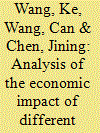|
|
|
Sort Order |
|
|
|
Items / Page
|
|
|
|
|
|
|
| Srl | Item |
| 1 |
ID:
088959


|
|
|
|
|
| Publication |
2009.
|
| Summary/Abstract |
Abatement cost is the main concern for climate change mitigation and the key factor for mitigation cost is technological change. This study established an integrated economic, energy, environmental, dynamic, computable general equilibrium (CGE) model representing endogenous technological change for China's climate change policy analysis. This study analyzed and compared the economic impact of different approaches to mitigation commitments as well as the potential role of technological change in the formulation of mitigation targets and commitments, taking into account China's climate policy-making needs based on the current international climate negotiation process. The results show that, absolute emission limits similar to the Kyoto Protocol will seriously impede the future economic development of China, while the impact of an 80% reduction in carbon intensity, forecast for 2050 based on the 2005 level, is relatively small. Technological change can promote economic growth, improve energy efficiency and reduce carbon intensity per unit of output through the substitution of production factors. Consequently it can reduce marginal abatement cost and related GDP loss by mitigation. At the same time it can increase mitigation potentials and extend the emission reduction amount, showing that consideration of the impact of technological change when deciding the emission reduction targets is necessary
|
|
|
|
|
|
|
|
|
|
|
|
|
|
|
|
| 2 |
ID:
115177


|
|
|
|
|
| Publication |
2012.
|
| Summary/Abstract |
Based on the review of the basic design of the sectoral crediting mechanism (SCM) - a promising option for developing countries' emission reduction commitments - this paper analyzes five important practical issues for China to solve before participating in SCM, which include (1) difficulties in determining a crediting baseline (2) the unsolved over-supply problem in the carbon market (3) the very likely "carbon credits falling short of mitigation costs" problem (4) the immature market-oriented price system jeopardizing the success of motivation incentives and (5) inadequate capacity building. Corresponding suggestions or compromise solutions are given after a discussion of each issue. It is also recommended that in order to witness SCM come into being, researchers and negotiators should endeavor to solve the practical issues that SCM meets now, bearing in mind the balance of interests of both developing and developed countries. Finally we believe that SCM's political barriers can be overcome when technical, economic institutional and capacity problems are solved.
|
|
|
|
|
|
|
|
|
|
|
|
|
|
|
|
| 3 |
ID:
103457


|
|
|
|
|
| Publication |
2011.
|
| Summary/Abstract |
This research builds a technology-based bottom-up model to estimate the performance of China's coal-fired electricity industry on resource consumption and environmental emissions. From the integrated estimation of three scenarios characterizing different stages of technology innovation in 2007-2030, technology innovation is proven to be the determinant in decreasing resource use and environmental effects from electricity production, but analysis based on current policies reveals some doubt in achieving the coal consumption intensity control target. Constrained with national control targets, the best route of technology innovation is calculated by integrated benefit targeting optimization. Supercritical (SC) and ultra-supercritical (USC) pressure boilers, flue gas desulfurization (FGD) and closed-cycle wet cooling with a high circulation ratio will be the mainstream technologies before 2030 based on current policy. It is inevitable to close or reconstruct small power plants from the late 2010s, and integrated gasification combined cycle (IGCC) and pressurized fluidized bed combustion combined cycle (PFBC-CC) plants will show a competitive advantage in the late 2020s. However, air cooling and FGD systems will expand slower than the authorities' expectation, while higher water prices and SO2 charges promote the expansion. Stricter restrictions are also found to be positive for technological progress.
|
|
|
|
|
|
|
|
|
|
|
|
|
|
|
|
|
|
|
|
|